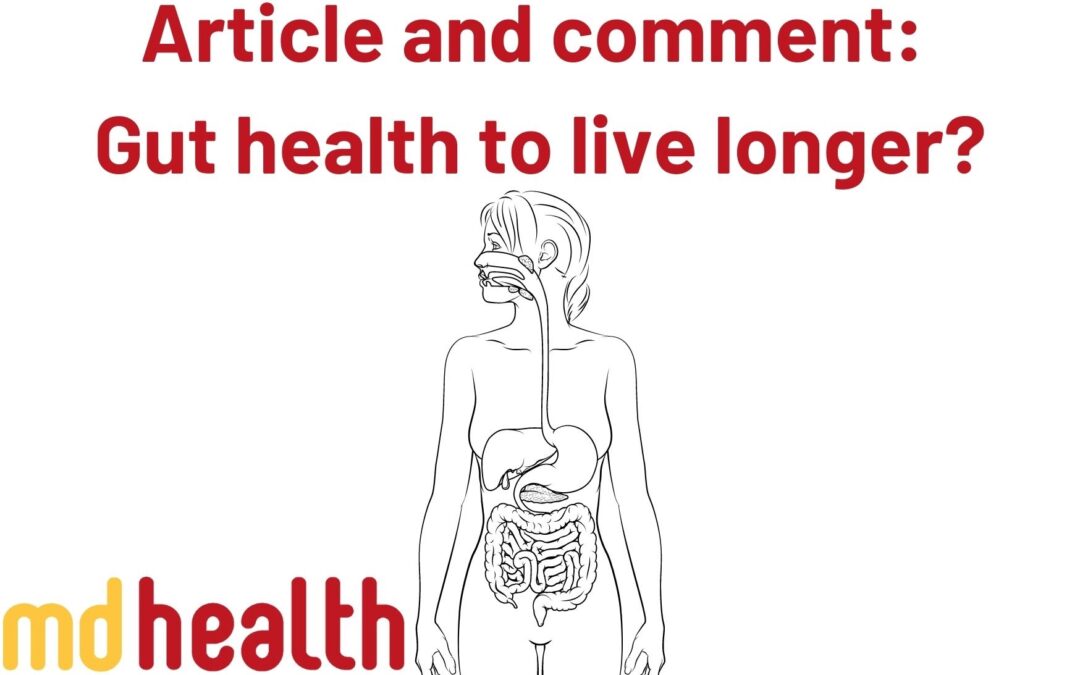Article and comment – Gut health to live longer?
As we get older, not only are we looking forward to a longer life, but a better quality life as well. Increasing research and evidence is demonstrating that its not only our fitness and strength make a difference. Instead, a healthy gut microbe balance seems to play a major part in this process as well. The great news is that we have a degree of control over this process by the choices that we make and the foods that we eat.
Our gut bacteria have two prevalent groups:
• Firmicutes – which like and feed on dietary fibre
• Bacteroidetes – which consume sugar and fat
In a recent study of 9000 people in the Seattle area, Nathan Price, at the Institute of Systems Biology, found that healthy aging was linked more to Akkermansia and Christensenella (Bacteria associated with lower inflammation, better sugar and fat metabolism and leaner body weight) and less to Bacteroidetes.
In studies of the longevity of South Korean villagers, greater and better quality longevity was associated with a more diverse gut bacteria. This gut bacteria had a higher ratio of Firmicutes to Bacteroidetes. This was particularly with those living independently, compared to those in aged care facilities.
Healthy centenarians have a gut microbiome rich in Odoribacteraceae, which feed on bile. These convert bile into secondary bile acids, which act as anti-biotics, even against antibiotic resistant infections. Thus, reducing the risk of infection. It treats pathogens as invasive species and typically destroys them on entry. Pathogens can damage the gut lining, increasing the chance of gut microbes entering the bloodstream. This may result in damage and inflammation around the body.
In healthy Chinese centenarians, gut flora enhances their ability to respond to inflammation. As we age, the immune system becomes less effective at switching on inflammation (to fight infection) and switching off inflammation (when not needed). Gut flora seem to play a part in regulating this system (Inflammaging). In 1 2019 mice study, mice fed inulin, which increases the growth of Akkermansia, reduced the size and the inflammatory response of microglia, the immune cells of the brain.
Although this has not been directly trialed on humans, in mice studies, faecal transplants from young mice to old mice resulted in major changes in the brain. This is including the hippocampus, the region associated with memory processing and stress response. These mice were better at learning and remembering where they were before. Conversely, faecal transfer from old to young animals led to cognitive decline and rats who received gut bacteria from humans with depression, developed depression like behaviour.
Gut bacteria is influenced by sex hormones. The relatively stable level of testosterone in boys/men means a more consistent gut bacteria. However a oscillating level of oestrogen will vary gut bacteria, and seems to influence the brain and mood, in particular, depression.
So, what can you do:
• Eat more vegetables – Especially ones that contain plenty of fibre- such as artichokes, asparagus, lentils and onions. Bacteria in the bowel produce short-chain fatty acids, which nourish a healthy gut lining, preventing the gut bacteria entering the bloodstream. They also produce dopamine and serotonin, which improve mood.
• East Fermented foods – Such as yoghurt, kefir, Simcha, kombucha and pickles. The bacteria that allow fermentation, fight pathogens and increase the shelf life of food. They also have a similar effect in our own gut when consumed, fighting pathogens.
• Probiotics – For Akkermansia and Christensenella, are not available on the market yet, but should soon be available as a supplement.
• Prebiotics – These are fibre supplements that feed the gut bacteria, such as inulin, resistant starch, beta-glucan, fructo-oligosaccharides and galacto-oligosaccharides. Each facilitate the growth of different microbes. A diverse gut microbe is associated with healthy aging, so diverse prebiotics is also the key, however, large doses of any one of these should be avoided to allow diversity and can give you abdominal cramps.
Anderson, S (2021) Young at Gut. New Scientist, 2nd October 2021, No. 3354. P38-42.
Do you have any questions?
- Call us on (03) 9857 0644 or (07) 3505 1494 (Paddington)
- Email us at admin@mdhealth.com.au
- Check out our other blog posts here
Our clinical staff would be happy to have chat if you have any questions.



